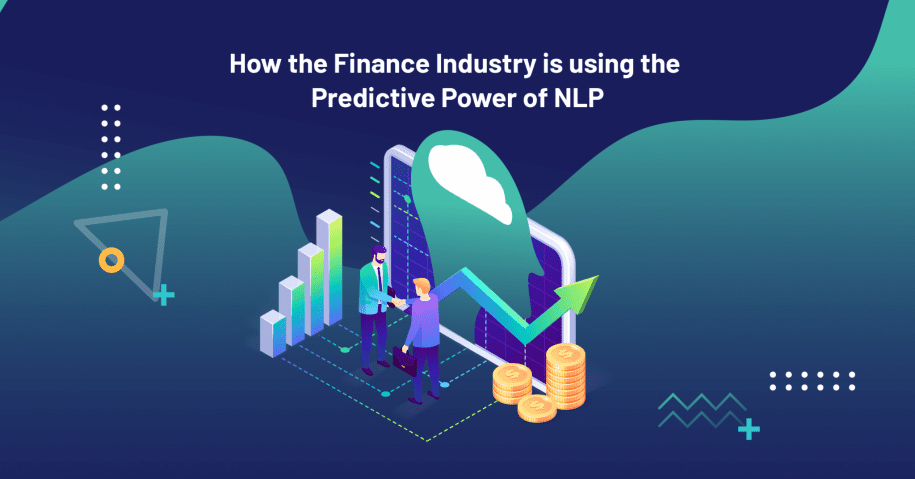NLP is a branch of Artificial Intelligence (AI), and with the introduction of machine learning algorithms and improved computing skills, NLP has become much more reliable and scalable. NLP tools, technologies, and APIs (application programming interfaces) are now pervasive in all industries, especially finance.
The NLP Power of Prediction
The financial industry depends on data to predict economic changes and market movements. Using NLP helps the finance industry analyse textual data, opening up a whole new frontline for asset managers, central banks, and finance professionals. Essentially, this technology allows companies to derive insights from written information such as advertisements, social media, news articles, and reports.
For researchers responsible for tracking and forecasting economic changes, NLP provides the ability to notice significant changes before they appear in numerical data. For example, news reports can capture evolving consumer sentiment in real-time, enabling capital managers and banks to act faster than before. NLP will revolutionise the ability to forecast economic and financial events.
NLP Financial Management Use Cases
NLP has specific financial applications such as credit risk assessment, auditing and bookkeeping, sentiment analysis, and portfolio selection. Below are a few examples of how NLP predictions are transforming the financial services sector.
1. Risk Assessment
Banks can use credit risk assessment to quantify the likelihood of successful loan payments. Payability is typically calculated based on previous spending patterns and loan payment history data. The NLP method uses multiple data points to assess credit risk.
For example, NLP can measure attitudes and entrepreneurship in business lending. It can also point out inconsistencies in data for further investigation.
Additionally, with the help of NLP, subtle aspects such as lender and borrower sentiment during the lending process can be taken into account.
2. Financial Sentiment
The success of trading on the stock exchange depends on the information about the selected stock. This knowledge helps traders decide whether to buy, hold or sell stock. In addition to analysing financial statements on a weekly/monthly/quarterly basis, it is important to know what financial analysts predict about companies, and this information can be tracked on social media.
For example, the news of a CEO’s resignation usually creates negative sentiment and negatively impacts stock prices. However, the stock market may take advantage of the situation and can take the news of the resignation positively and raise stock prices.
Dataminr and Bloomberg are examples of companies that provide such transaction information.
3. Accounting and Audit
Ernst & Young, Deloitte, and PwC focus on assessing reasonable and effective audits of a company’s annual performance. Deloitte, for example, has evolved the audit command language into a more efficient NLP application. The organisation recognises the importance of NLP in gaining significant benefits in the audit process, especially after dealing with documents such as invoices and never-ending daily transactions for decades.
NLP allows financial professionals to focus, identify, and visualise anomalies in their daily transactions. With the right technology, you spend less time and effort identifying transaction irregularities and their causes.
NLP helps identify significant potential risks and fraud cases such as money laundering. This allows you to increase value-added activities and spread them throughout the company.
4. Financial Portfolio Optimisation
The financial investor’s main goal is to maximise capital in the long run without knowing the basic distribution of stock prices. Financial exchange investing strategies can be predicted using data science, machine learning, and nonparametric statistics.
The historical data collected can predict the trading period and the opening of the portfolio. This data allows investors to distribute their current capital to the available assets. NLP can be used to optimise one-log optimal portfolios. Semi-log optimal portfolio selection is a computational alternative to log optimal portfolio selection. With its help, the highest possible growth rate is achieved when environmental factors are uncertain. Data envelope analysis can be used to select portfolios by excluding unwanted stocks.
5. Predicting Resource Behaviour and Tracking Customer Spending Patterns
Time-series forecasting of financial analysis is a complex task due to data fluctuations and irregularities, as well as long-term and seasonal fluctuations that can lead to major errors in the analysis. However, in combination with NLP, deep learning surpasses previous methods that worked in financial time series. The combination of these two technologies can effectively process large amounts of information.
NLP is a very effective way to predict time series such as stock prices in the financial sector. It has the unique ability to determine complex nonlinear relationships and to accurately approximate nonlinear functions. These methods provide a high level of accuracy and are viable alternatives to existing traditional stock index forecasting methods. NLP and deep learning techniques help predict stock price and trend volatility and are also valuable tools to guide equity trading.
6. Sentiment Analysis and Collecting Customer Feedback
Sentiment analysis helps to categorise news based on positive and negative sentiment and shows potential impacts on stock prices, but it also has more subtle uses like retrieving customer emotions and testimonials on products. NLP allows procurement of customer feedback and taking crucial financial decisions based on customer testimonials.
7. Tracking Relationships and Automating Capture of Earnings Calls
It is essential to use tags to highlight key topics covered in text or topic modelling in the investment arena. This can help analyse revenue and earnings calls to determine key topics or compare with previous earnings calls. NLP provides value because it can link entities to create relationship diagrams. For example, an entity modelling system can select a reference to a particular topic in a set of unstructured text and establish a new connection.
8. Content Enhancement and Marking Context Data in Query Results
Financial companies can use content enhancements to better manage their investments and improve risk management and compliance. Content intelligence systems are committed to completing and enhancing enterprise-wide data with a wealth of contextual information to generate real-world, actionable insights. Content Intelligence is a new technology that drives content strategies through data-driven analytics of content and its consumer impact.
This brings direct and indirect economic benefits from content marketing initiatives such as reducing waste and improving ROI. These tools leverage NLP technology to do the following:
- Evaluate the tone of the content
- Identify patterns
- Make informed decisions
- Find out what the content is for and how to route it to the right topic
- Generate and curate content for engagement platforms
NLP helps companies reach their financial sector content enhancement goals in the following ways:
- Identify the most attractive thought leadership blogs and differentiate the content from competitors.
- Deliver a personalised customer experience through targeted customer-specific content.
Management consultancy McKinsey has a content enhancement and intelligence model that reviews data content and performs quality and integrity checks.
9. Customer Service
Financial companies need to provide their customers with high-quality services that require a complete understanding of their data and information. NLP algorithms predict and identify customer issues and enable banks to develop policies and services to address these issues.
10. Financial Document Analyser
With the help of AI-assist technology, users can integrate document finance solutions into their current workflow without interrupting the existing methods. NLP allows financial professionals to read and understand large numbers of financial documents automatically. Organisations can use their existing document resources to train their NLP models. NLP-powered financial report analysers then search hundreds of these documents to extract and integrate the most relevant and insightful information.
Conclusion
Over the last few years, NLP algorithms have become significantly more consistent, reliable, accurate and scalable, providing financial decision-makers with a complete picture of the market. NLP is used in the financial industry to dramatically reduce day-to-day tasks, speed up transactions, analyse risk, understand finance and build portfolios while automating auditing and bookkeeping.



Leave a Reply